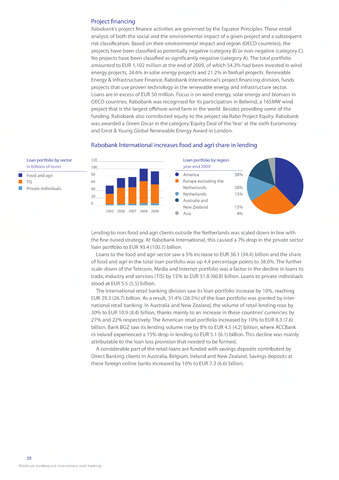TIS
29
Project financing
Rabobank's project finance activities are governed by the Equator Principles. These entail
analysis of both the social and the environmental impact of a given project and a subsequent
risk classification. Based on their environmental impact and region (OECD countries), the
projects have been classified as potentially negative (category B) or non-negative (category C).
No projects have been classified as significantly negative (category A).The total portfolio
amounted to EUR 1,102 million at the end of 2009, of which 54.3% had been invested in wind
energy projects, 24.6% in solar energy projects and 21.2% in biofuel projects. Renewable
Energy Infrastructure Finance, Rabobank International's project financing division, funds
projects that use proven technology in the renewable energy and infrastructure sector.
Loans are in excess of EUR 50 million. Focus is on wind energy, solar energy and biomass in
OECD countries. Rabobank was recognised for its participation in Belwind, a 165MW wind
project that is the largest offshore wind farm in the world. Besides providing some of the
funding, Rabobank also contributed equity to the project via Rabo Project Equity. Rabobank
was awarded a Green Oscar in the category'Equity Deal of the Year'at the sixth Euromoney
and Ernst Young Global Renewable Energy Award in London.
Rabobank International increases food and agri share in lending
Loan portfolio by sector
in billions of euros
Food and agri
Private individuals
Lending to non-food and agri clients outside the Netherlands was scaled down in line with
the fine-tuned strategy. At Rabobank International, this caused a 7% drop in the private sector
loan portfolio to EUR 93.4 (100.7) billion.
Loans to the food and agri sector saw a 5% increase to EUR 36.1 (34.4) billion and the share
of food and agri in the total loan portfolio was up 4.4 percentage points to 38.6%. The further
scale-down of the Telecom, Media and Internet portfolio was a factor in the decline in loans to
trade, industry and services (TIS) by 15% to EUR 51.8 (60.8) billion. Loans to private individuals
stood at EUR 5.5 (5.5) billion.
The international retail banking division saw its loan portfolio increase by 10%, reaching
EUR 29.3 (26.7) billion. As a result, 31.4% (26.5%) of the loan portfolio was granted by inter
national retail banking. In Australia and New Zealand, the volume of retail lending rose by
30% to EUR 10.9 (8.4) billion, thanks mainly to an increase in these countries'currencies by
27% and 22% respectively. The American retail portfolio increased by 10% to EUR 8.3 (7.6)
billion. Bank BGZ saw its lending volume rise by 8% to EUR 4.5 (4.2) billion, where ACCBank
in Ireland experienced a 15% drop in lending to EUR 5.1 (6.1) billion. This decline was mainly
attributable to the loan loss provision that needed to be formed.
A considerable part of the retail loans are funded with savings deposits contributed by
Direct Banking clients in Australia, Belgium, Ireland and New Zealand. Savings deposits at
these foreign online banks increased by 10% to EUR 7.3 (6.6) billion.
120
2005 2006 2007 2008 2009
Loan portfolio by region
year-end 2009
America 38%
Europe excluding the
Netherlands 28%
Netherlands 15%
Australia and
New Zealand 15%
Asia 4%
Wholesale banking and international retail banking

